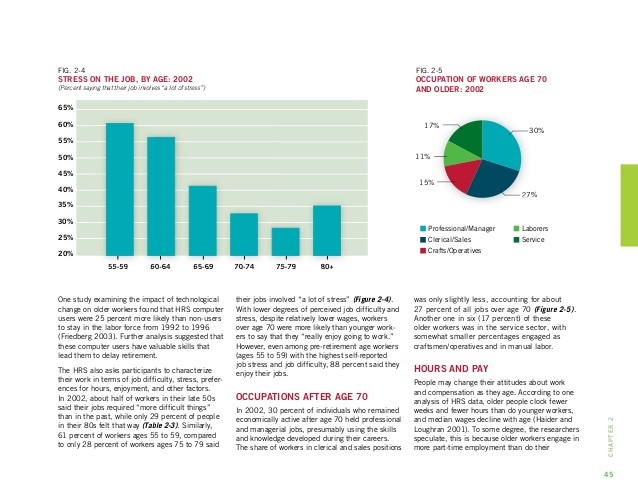Study Almost 40 percent of workers may never retire
Post on: 16 Март, 2015 No Comment

Share This Story
Almost 40 percent of working Americans plan to retire after age 70 or not at all, according to a new survey from Transamerica Center for Retirement Studies.
The results of the 12 th Annual Transamerica Retirement Surveyconducted among 4,080 American workersfound that for many Americans, the foundation of their retirement strategy is simply to not retire or to work considerably longer than the traditional retirement age of 65.
Of those who plan on working after retirement or age 65, the most commonly cited reasons are out of necessity (44 percent).
While many workers may plan to work past the traditional retirement age or never retire, unforeseen circumstances could force them to stop working before they planned. The survey found the majority of workers are unprepared for this scenario70 percent agree they could work until age 65 and still not have enough money saved to meet their retirement needs. This sentiment spans across age and income:
- 69 percent of those in their twenties and 72 percent of those in their thirties agree they could work until age 65 and still not have enough money saved, 80 percent of those with a household income (HHI) of less than $50,000 agree, 74 percent of those with an HHI $50-$100,000 agree, And, 59 percent of those with an HHI over $100,000 agree.
Meanwhile, about a third of workers (31 percent) anticipate not just needing to provide for themselves in retirement, but for additional family members as well.
With all of lifes uncertainties, planning not to retire is simply not a viable retirement strategy, says Catherine Collinson, president of the Transamerica Center for Retirement Studies. Planning to work past age 65 is an important opportunity to continue earning income, save more, and help to alleviate a retirement savings shortfall; however, its important that workers be proactive in setting a retirement savings goal, saving and investing for retirement, and having a backup plan if they are forced to retire sooner than expected.
Seven Steps to Retirement Success
American workers estimate their median retirement savings needs at $600,000 but, in comparison, less than one-third (30 percent) currently have $100,000 or more saved in all household retirement accounts. This discrepancy leads to real anxiety about retirement: the survey revealed top fears include outliving my savings and investments and not being able to meet the basic financial needs of my family.
How each worker dreams of spending their retirement is unique, but the tools to reach retirement goals are common to everyone. These tactics can help workers get started developing a strategy:
1. Get the conversation going with friends and family. Just 9 percent of workers frequently discuss saving, investing and planning for retirement with family and friends
2. Formulate a plan and write it down. Only 10 percent of workers have written out their retirement strategy
3. Get educated. The majority of workers (71 percent) say they do not know as much as they should about retirement investing
4. Consider retirement benefits as part of your total compensation. 53 percent of workers would select a job offer with a higher-than-expected salary, but poor retirement benefits, over one with excellent retirement benefits and minimum salary requirements
5. If your employer offers a plan, participate. And if your employer doesnt offer you a plan, ask for one. Just 71 percent of workers report being offered an employee-funded plan at work, while 92 percent say a plan is an important benefit. However, almost one-quarter of workers (22 percent) who are offered a plan at work do not participate
6. Take advantage of the Savers Credit. Make catch-up contributions. Just 25 percent of workers are aware of the Savers Credit. Just over half of workers (56 percent) are aware that people age 50 and older may be allowed to make catch-up contributions to their retirement plan
7. Have a backup plan in the event you are unable to work before your planned retirement: Only 19 percent of workers currently have a backup plan
For the full survey results and for resources about retirement planning, visit www.transamericacenter.org .














